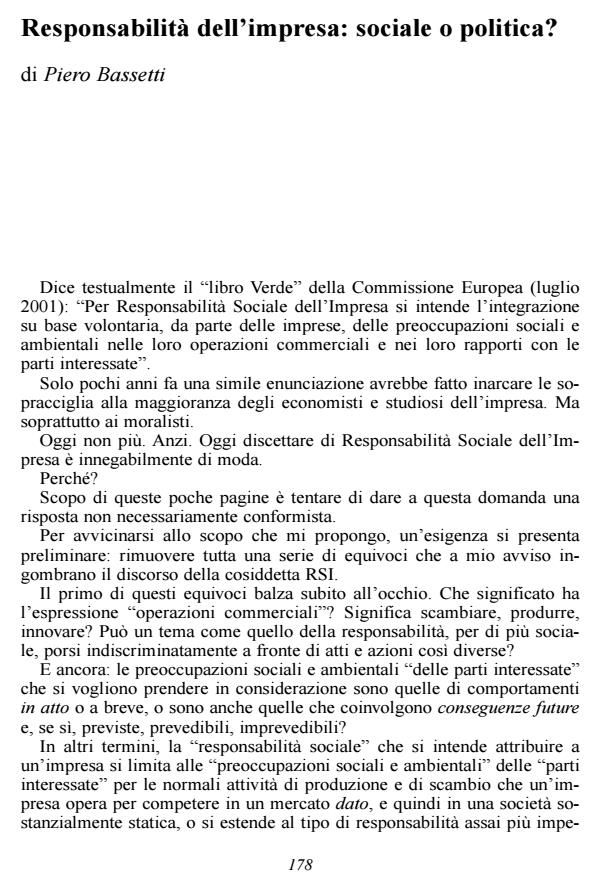Responsabilità dell'impresa: sociale o politica?
Journal title SOCIOLOGIA DEL LAVORO
Author/s Piero Bassetti
Publishing Year 2004 Issue 2004/96
Language Italian Pages 11 P. File size 30 KB
DOI
DOI is like a bar code for intellectual property: to have more infomation
click here
Below, you can see the article first page
If you want to buy this article in PDF format, you can do it, following the instructions to buy download credits

FrancoAngeli is member of Publishers International Linking Association, Inc (PILA), a not-for-profit association which run the CrossRef service enabling links to and from online scholarly content.
Corporate Responsibility: social or political? ABSTRACT: The question of responsibility is certainly a topical matter. Here Dr. Piero Bassetti sets out to explain why this is, attempting at the same time to avoid the usual, conventional responses. Contrary to what it might appear, the central problem is not moral but pragmatic. We should not therefore ask whether a business should respond to social problems with a sense of social responsibility, but rather concern ourselves with the ability of a business to respond to changes which are necessary to provide punctual, efficient and effective responses for its position. Getting to the bottom of this problem is not simple because its premises are complex, both in content and in terminology. Certainly real social responsibility lies in the ability to responsibly fulfil the task of pursuing socially valid objectives rather than ‘coexisting with stakeholders while carrying out worthy, socially acceptable actions’. It is precisely the choice of objectives, therefore, which is at the centre of our discussion and which inevitably raises the issue of innovation: that is, knowledge combined with capital. The world is changing, and it is changing by the process of innovation, which is to say the developing alliance of knowledge with capital. Knowledge is assuming ever-increasing importance in business, and businesses, sharing a leading role in innovation, have inevitably met with politics. The role of a business, therefore, is no longer politically subordinate but equal. As such, a business must take on responsibility much greater than that of ‘worthy actions’. A business cannot define itself as neutral, but must rather recognise the fact that it has played a part in guiding the processes of innovation. In short, a business must admit to having taken part in, and continuing to take part in, politics. The business person must therefore assume responsibility for the morals or, better, the ethical values of these actions. Modern politics is not only a battle of wills and of power but also of knowledge and when these are intertwined in a decision everyone involved must recognise the ethical imperative.
Piero Bassetti, Responsabilità dell'impresa: sociale o politica? in "SOCIOLOGIA DEL LAVORO " 96/2004, pp , DOI: